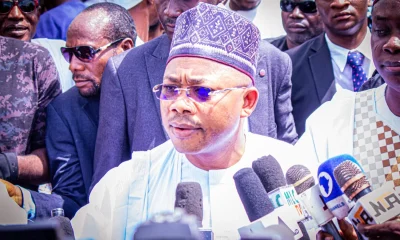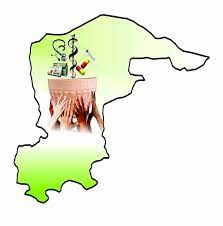NEWS
Reps Express Anger Over 5 Years Unaudited Accounts of FMB, TETFUND

The House of Representatives Committee on Public Accounts has expressed displeasure over its discovery of five years unaudited accounts of the Federal Mortgage Bank of Nigeria (FMB) and the Tertiary Education Trust Fund (TEFFUND).Rep Oluwole Oke, Chairman of the Committee, conveyed the committee’s anger at the investigative hearing on audit queries by the Auditor-General of Federation (AGF) of Ministries Department and Agencies of government, on Thursday, in Abuja.
Oke said that the Central Bank of Nigeria (CBN) and the Nigeria Social Insurance Trust Fund (NSITF) had not paid their respective 30 per cent and 20 per cent equity capital as shareholders of the bank, as stipulated by the FMB establishment Act.The Committee queried the Managing Director of FMB, Mr Ahmed Dangiwa and other officials of the bank on the five years unaudited accounts, while noting that the audit queries raised by the AGF on the MDAs, had shown that their revenue profiles were on the decline.Oke expressed dissatisfaction with non-compliance of the agencies to the extant provisions of the laws on audited accounts, in spite of previous appearances before the committee on the contentious issue.Responding, Dangiwa explained that the Federal Government had paid N60 million out of the N1.5 billion, being its share of equity in the bank, adding that the audited accounts were ready, but awaiting the approval of the bank’s board.He said that the present management of the bank inherited the five years unaudited accounts from its predecessor, but had made efforts to clear them.The managing director also explained that the federal government owned 50 per cent of FMB, with the CBN owning 30 per cent, while the NSITF’s share was 20 per cent, of the bank’s percentage equity shareholding. (NAN)NEWS
Food Security: Ododo Pledges Support for Lagos Produce Initiative

From Joseph Amedu, Lokoja
Kogi State Governor, Usman Ododo has pledged full commitment to the “Produce for Lagos” initiative.Ododo described the initiative as a bold inter-state collaboration that will deepen food security, boost agricultural productivity and deliver structured prosperity for farmers.
He made the promise during the official launch of the programme and the N500 billion Offtake Guarantee Fund held at Lagos House, Alausa, Ikeja. The event, hosted by Governor Babajide Sanwo-Olu of Lagos State, drew attendance from several state leaders, including the Governors of Ogun, Niger, and Taraba States, as well as representatives from the Governors of Jigawa and Kwara States.All participating states pledged to align with the vision of establishing a sustainable national food supply chain through a dependable partnership with Lagos, Nigeria’s largest consumer market.In his remarks, Ododo emphasized the historical ties between Kogi and Lagos and affirmed that the partnership marks a new era in mutual investment and food system integration.He noted that Lagos consumes food and Kogi produces food, and when both collaborate, the result is national food security, market stability, and inclusive economic growth.The Kogi State Governor highlighted the state’s ongoing investment in agriculture, including land preparation, mechanized farming, improved seedlings, livestock breeding, and financial support to over 10,000 farmers.He stated that Kogi is Nigeria’s leading producer of cassava and among the top producers of yam, maize, and ginger.According to him, the partnership with Lagos provides Kogi farmers with market assurance and confidence to expand production, knowing there is a structured offtake system in place.Ododo also commended Origin Tech Group Nigeria Limited for their investment in the project, describing the private sector as a critical driver of Nigeria’s agricultural transformation.He praised the Lagos State Government for its vision and boldness in launching the ₦500 billion Offtake Guarantee Fund, which is expected to support producers, aggregators, logistics players, and traders across the entire food value chain.The Lagos State Government described the initiative as a strategic step toward creating a food hub for the entire nation.Officials said the programme is designed to reduce post-harvest losses, lower food inflation, and drive down dependency on imports while creating jobs and stimulating rural economies.The programme is also expected to benefit from strong private sector participation, with major players like Heirs Holdings pledging significant support.Chairman Tony Elumelu committed N25 billion to the initiative, expressing confidence in its ability to address food insecurity and unemployment.The launch of the Produce for Lagos initiative was widely praised by stakeholders as a major milestone in cooperative governance.Leaders present emphasized that collaboration among states and between public and private sectors remains the surest path to achieving a resilient and prosperous Nigeria.
NEWS
NEDC Flags off Distribution of Building Materials to Yobe Flood, Conflict Victims

From Muhammad Gambo, Damaturu
North East Development Commission in Yobe State, has flagged off the distribution of Building Materials to people of 13 Local Government Areas affected by Flood and Conflicts.The Distribution exercise which took place at the Store of the Commission in Damaturu, also featured the handing over of Search and Rescue Equipment to the State Emergency Management Agency (SEMA).
Prof. Ali Ibrahim, the State Coordinator of Yobe NEDC, while flagging off the distribution of the materials said, the exercise is part of its effort to minimize the effects of anticipated floods across Yobe State.The Search and Rescue Equipment donated to the State Emergency Management Agency, he said are aimed at minimizing the risk associated with rescue during the anticipated floods noting that SEMA officials face challenges in the process of rescuing victims of flood.Commenting on the support of the search and rescue equipment provided to Yobe SEMA by the NEDC, the Commissioner Yobe State Ministry of Humanitarian Affairs and Disaster Management Dr. Mairo Ahmed Amshi and the Executive Secretary of the Agency, Dr. Muhammad Goje said the support came at the right time.With the symbolic flagged off, the Building Materials are handed over to the Chairmen of the benefitting Local Government Areas for onward distribution to the rightful beneficiaries.NEWS
Reps Identify Huge Renewable Energy Gaps in Nigeria

By Ubong Ukpong, Abuja
The House of Representatives on Thursday, said that there was a fifty percent unmet need in the Renewable Energy skilled labour sector.Chairman, House committee on Renewable Energy, Rep. Afam Ogene, said this during the Africa Policy Dialogue (APD) workshop with the theme: Green jobs and low carbon transition,” in Abuja.
Ogene said that the unmet needs had impeded employment of quality technicians and employees in the sector. ”Today, nearly 50 per cent of skilled labour needs in Nigeria’s renewable sector remain unmet.”Employers across the country consistently report difficulty hiring qualified technicians, engineers, and system operators,” he said.He affirmed the gap in local equipment manufacturing, saying that most equipment used in renewable energy power generation was imported.According to him, this potentially causes loss of green job opportunities.Ogene however said that this development was not as a result of shortage of the raw resources to locally manufacture, but because of the skill gaps and inadequate policies to ensure knowledge transfer.He explained that the gap was not just a workforce problem, but a policy problem.The Committee Chairman said that China, through its green job programme backed by Government policies and funding, had recorded an estimated total of over 7 million green jobs.He called on Nigeria’s academic institutions to align with the energy transition’s demands.Ogene, who reiterated the commitment of the legislature to improved Renewable Energy delivery, said that lawmakers recognized that crafting effective green jobs legislation for women and youth was imperative.He explained that such required meticulous work to ensure alignment with existing laws and potency in achieving their goals.According to him, with my team of experienced colleagues, expert legal advisors, and skilled legislative drafters, we’re confident in delivering a comprehensive and impactful law the nation will be proud of.Speaker, House of Representatives, Rep. Abbas Tajudeen said that the dialogue was in accordance with the role of the 10th Assembly which aligned directly with the broader oversight and legislative responsibility.Abbas, represented by the Deputy Minority Whip, Rep. George Ozodinobi, affirmed the 10th Assembly’s commitment to investigate policy gaps and propose solutions that were meaningful, realistic and impactful in addressing the challenge.”Let me sincerely thank the Chairman and Members of the Committee on Renewable Energy for their diligence, foresight, and relentless effort in championing this important cause.”As a responsible People’s House, we are fully aware of the strategic importance of green energy, not just because of its environmental significance but also due to its immense economic potential.”Abbas said that the loud and urgent call for a just energy transition in Nigeria was a reflection of a dual reality.According to him, our vulnerability to the impacts of climate change and our untapped renewable energy potential.The Speaker restated the determination of the parliament to collaborate with relevant stakeholders in creating jobs to improve energy access, from preserving our ecosystems to reducing dependency on fossil fuels.He expressed the imperatives of the legislative agenda as placing a strong emphasis on energy transition as a key pillar in tackling unemployment and environmental degradation.He said that Nigeria was at a critical juncture where bold and deliberate policy choices could determine expected leap ahead into a sustainable future or remain stalled by outdated systems.He called for urgent action to tap into renewable energy as a way forward in tackling youth unemployment and under-employment.Also speaking, a representative of INCLUDE Knowledge platform, Ms Victoria Manya expressed the platform ‘s belief in not just transition but increasing renewable energy skills in Africa.Manya warned that the low-carbon transition risked becoming the handmaiden of fossil fuel interests—delivering decarbonization targets on paper.”What we must do is reclaim the transition—not only as a climate imperative—but as a generational opportunity to rewrite our social contract.”In Nigeria, the data is clear: too many young people are unemployed or underemployed, and too many women are shut out of emerging green sectors.”She explained that “a just transition must not only ask how we reduce emissions—but who gets the new jobs, who trains the workforce, and who shapes the policies.”Manya said that Nigeria stood at the same global threshold with bigger renewable energy nations, with a unique opportunity to lead Africa in embedding labour justice into climate action.
























